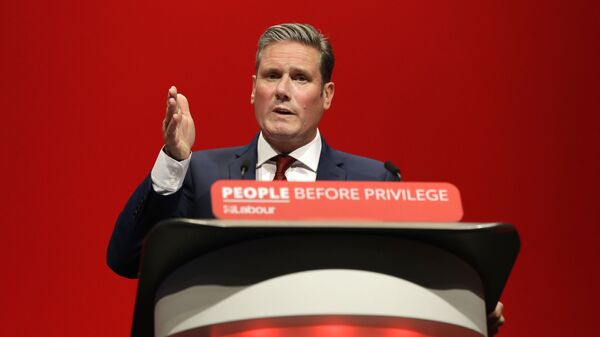Keir Starmer has generated a flurry of media fascination after becoming the first Labour MP to moot a run for leader in the wake of the party’s dismal General Election performance.
The ardently pro-Remain shadow Brexit secretary revealed he’s “seriously considering” entering the leadership race, scheduled to take place in early 2020, and framed himself as a unity candidate, attacking the “factionalism” within Labour and discussing the need for the party to be inclusive of all views, while warning against moving too far rightwards. He also dismissed suggestions of a return to Tony Blair’s New Labour era.
David vs. Goliath
Born in London’s Southwark, Starmer has always had Labour in his DNA – he was in fact named after the party’s first MP, Keir Hardie.
Graduating from the University of Oxford with a Bachelor of Civil Law (BCL) degree in 1986, he became a barrister the next year. Quickly gaining a reputation for taking the side of the underdog against power, he was propelled to national recognition as a result of the McLibel trial in the early 1990s.
The food chain's legal budget ran well into the millions – Steel and Morris received no legal aid, and fought their case purely on donations, which amounted to around £30,000. However, Starmer stepped in and offered them legal representation completely free of charge.
He was appointed Queen's Counsel in 2002, and was joint head of his chambers in Doughty Street – in 2007, he was named "QC of the Year", and the next year was named next head of the Crown Prosecution Service.
Starmer’s period in the post was not without controversy. For instance, in 2012 it was alleged he was personally responsible for the prosecution of Paul Chambers, an airline passenger had posted a joke about Doncaster Sheffield Airport on Twitter due to his frustration at airport delays, in which he threatened to “[blow] the airport sky high”.
— Naughty Boy #RemainerStill 🇪🇺 🏳️🌈 (@RemainOnly) December 18, 2019
Despite the airport manager dismissing the ‘threat’ as "not credible", Chambers was eventually prosecuted for sending a message "of a menacing character", which provoked widespread protest by free-speech activists – the CPS consistently rejected Chambers' appeals however. According to Chambers' friends, prosecutors had amenable to allowing an appeal, but Starmer over-ruled his subordinates because he was "trying to save face by refusing to admit he was in the wrong".
He left the CPS 1st November 2013, and was quickly recruited as a parliamentary candidate by Labour. He was elected MP for Holborn and St Pancras at the 2015 general election with a majority of 17,048 – not long afterwards, following the resignation of Ed Miliband, party activists urged him to stand for leader. He declined due to his lack of political experience, and instead backed candidate Andy Burnham.
Fifth Columnist
In the event, Jeremy Corbyn won the leadership race, and promptly appointed Starmer to shadow Home Office minister in September 2015 – he would resign 27th June 2016 in protest over Corbyn’s incumbency, and supported Owen Smith in the September 2016 Labour Party leadership election.
— Alastair Thompson (@AlastairJT) February 15, 2018
Starmer’s dissent didn’t make him persona non grata with the Labour chief however, and he was appointed Shadow Secretary of State for Exiting the European Union in October that year. As a result, he resigned from a consultancy position with law firm Mishcon de Reya that acted for campaigner Gina Miller in bringing legal proceedings against the Secretary of State for Exiting the European Union.
Nonetheless, given the Conservatives built a vast majority off the back of their committed Brexit platform, Starmer’s Brexit stance may not endear him to voters in traditional Labour seats which went blue – some for the very first time – on 13th December.
He has rejected the notion the result of the 2016 referendum on the UK’s membership of the EU in any way provided a mandate for "hard Brexit", and was a key advocate for a ‘People’s Vote’, a second Brexit referendum in effect. Many analysts have attributed Labour’s crushing defeat in the 2019 General Election to the party’s adoption of this policy.


